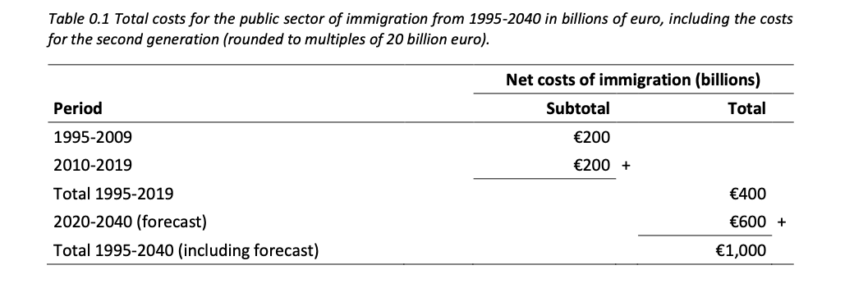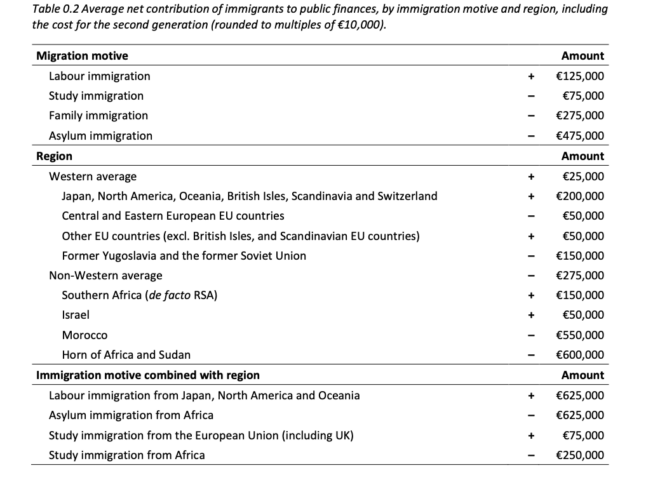Immigration could cost the Dutch exchequer Є600 billion over the next two decades if current trends remain unchained according to academics from the University of Amsterdam’s School of Economics.
In a research paper entitled Borderless Welfare State: The Consequences of Immigration for Public Finances academics including experts from the fields of economics, mathematics, sociology, and public administration said that pressures associated with immigration could render the Dutch welfare system “unsustainable”.
While some immigrants represent a net positive for the economy, figures from across all four categories examined in the study indicate this economic boost is more than negated when viewed in context of the full picture of immigration in the Netherlands.
The paper highlighted the cost of accepting immigrants in billions of euros from 1995 – 2040 (forcast) inclusive of the costs of second generation immigrants outlining how the Dutch population is growing due to immigration.
Of the population of the Netherlands at the end of 2019 – 17 million – 13% were born abroad (first generation) and 11% were children of immigrants (second generation).
“Currently, per capita expenditures on immigrants are significantly higher than on Dutch native people in areas such as education, healthcare, justice, social security and allowances.” it said, adding. “Moreover, immigrants pay fewer taxes and social security premiums.”
The cost to the Dutch exchequer of accepting immigrants from Morocco and the Horn of Africa is between €475,000-€625,000 per immigrant it said.
“The main findings for the net contribution (benefits minus costs) of the first two generations together are given in Table 0.1. The total net cost of immigration was on average 17 billion euro per year over the period 1995-2019 (i.e. on average for immigrants arriving in a calendar year).”
The paper says that this figure is equal to what the Dutch government spent on defence and unemployment benefits “combined” in 2016.
“In 2016, net costs peaked at 32 billion euros, partly due to the ‘refugee crisis’. The total cost over the 1995-2019 period was 400 billion euros, an amount of the same order of magnitude as the total Dutch natural gas revenues from the start of extraction until 2019.” it added, continting that based on forecasts from Statistics Netherlands, “the report estimates the total cost of immigration for the next two decades at 600 billion euros if policy remains unchanged.”

In its analysis of the ‘costs and benefits by immigration motive and region’ the paper says “the net contributions of immigrants vary” stating that there are “large differences between western and non-western immigrants.”
“On average, western immigrants make positive contributions of €25,000 and non-western immigrants cost €275,000” it said, adding that” within the western and non-western categories, however, there is a lot of variation.”
The study found that immigration from most western regions was “ positive for the treasury” noting that immigrants from Japan, North America, Oceania, the British Isles, Scandinavia and Switzerland “make a substantial positive contribution of around €200,000 per immigrant.”
While immigration from Central and Eastern European countries costs €50,000, excluding former Yugoslavia and the former Soviet Union. “The latter two areas of origin mainly involve asylum migrants who make a substantial negative contribution of €150,000.” it said.
The authors said that iImmigration from non-Western regions “tends to be negative for the treasury” which is “especially true” for the regions of the Caribbean, Middle East (including Pakistan and Turkey) and North, Central and West Africa (net costs of €200,000 to €400,000), Morocco (€550,000) and the Horn of Africa and Sudan (€600,000).
The study found that there are “substantial differences” between groups with different immigration motives.
“Only labour immigration generates a positive average net contribution of €125,000 per immigrant. Study migration costs a net €75,000 on average. Family migration costs the treasury €275,000 per immigrant on aver- age. The net cost of asylum migration averages €475,000 per immigrant.” it said.
